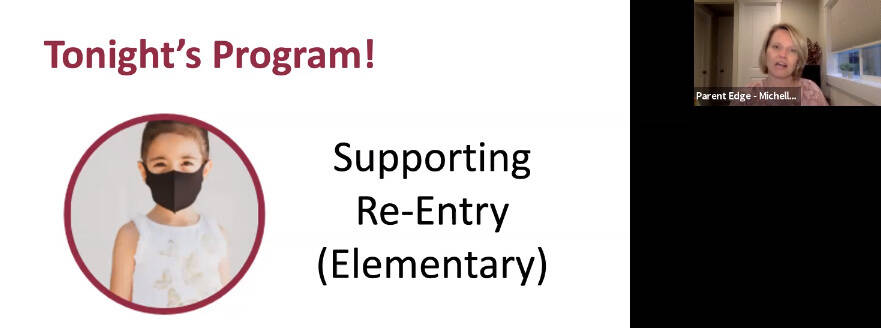A little over three weeks into the in-person, masked-up indoors school year, Mercer Island parents noticed some new behaviors in their elementary school children.
As a host of parents weighed in on a poll to begin an MI Parent Edge virtual presentation on Sept. 20, the initial answers were: enthusiasm for learning in school, challenges with organization and time management and sleep issues.
Students’ mental well-being was the focus of “Supporting Re-Entry (Elementary),” which was presented in partnership with MI Parent Edge and Mercer Island Youth and Family Services (MIYFS) and featured a trio of the latter organization’s school-based counselors.
“I think it’s important for us to think about where our kids are and what is normal in this situation we have where we are all facing this trauma,” said MI Parent Edge’s Michelle Ritter, who echoed the sentiments of Laura Falsgraf, an MIYFS counselor at Northwood Elementary, in describing the pandemic.
Falsgraf noted, “In truth, this pandemic is considered a natural disaster, so we are in a traumatizing experience. Trauma really lies in how a person perceives the experience. Living in a community like Mercer Island, it doesn’t mean that we are all well off and not in need of support or help or having the knowledge about how our kids could be impacted.”
During her segment of the presentation, Falsgraf discussed how parents could help their children through physical symptoms, changes in behavior, changes in mood and changes in thinking as the pandemic continues. Some suggestions are giving a voice and choice when able, sticking with a routine, providing a space for expressing and/or talking about difficult feelings, practicing and planning for relaxation, and prioritizing what their true needs may be.
“The core of a trauma-informed response is to build those strong relationships with your kids. Show that you accept your child regardless of their struggles or regardless of their willingness to do work or accomplish tasks, and meet them where they are,” Falsgraf said.
Anna Orton, a counselor at West Mercer Elementary, said that resiliency is a key element to tackling the changes that children and parents are dealing with during the pandemic. The process will not be smooth, and there will be trials and errors, she added.
Vital ways to make progress are by having strong social connections and relationships, feeling a sense of purpose, learning to be flexible and adapt to change and focusing on hope. Another way to help, Orton added, will be for parents to give their kids a little extra love during this transition. If parents feel more attention is needed, they might want to reach out to a school counselor or community member.
“This year the lift we’re asking for our kids is to start a new school year that’s abnormal because of its normalcy after they’ve lived through the past 20 months. Our kiddos aren’t used to full-day, full-class school and that’s what they started right out the gate when school started this year,” Orton said.
Discussing that things have been rough and that everyone’s in it together is one way for families to move forward, said counselor Julie Wood, who contracts through MIYFS and has her own practice working with children and adolescents.
With both students and parents feeling stress and anxiety, Wood offered a way for parents to connect with their children in trying to rise above any emotional issues.
“One of the easiest, most do-able ways to not pass on our anxiety is to name it. When we name it, it sort of takes the wind out of the sails. Ironically, it’s more helpful for your kid to hear, ‘Ah, I’m so worried and I’m trying to figure out how to reduce my worry’ than to keep it all bottled up,” Wood said.
When parents share those uncomfortable moments with their children, it can allow them to put their heads together and discuss what choices to make in order to feel better, Wood added.
For more information, visit https://miptacouncil.membershiptoolkit.com/miparentedge_home and https://www.mercerisland.gov/yfs.


